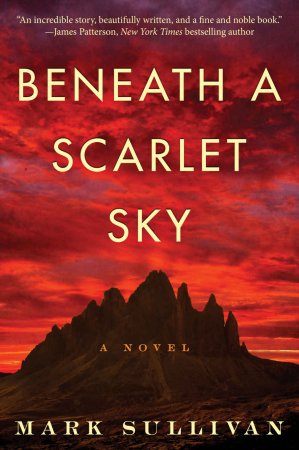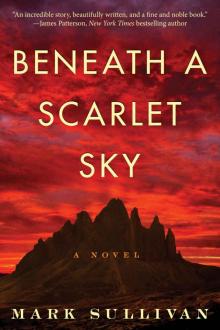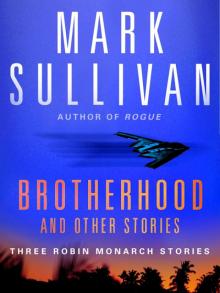- Home
- Mark Sullivan
The Last Green Valley Page 23
The Last Green Valley Read online
Page 23
“Why are you not in the Wehrmacht?”
“I am the only able-bodied man left in my entire family,” he said. “The VoMi decided it was better for Germany to have me back on my farm, growing wheat for the Fatherland.”
The soldier looked skeptical. “Have you not enrolled in Selbstschutz?”
“I don’t know what that is.”
“A home guard to protect your village against the Romanian swine. And a way to show us that you are a true German and a useful person.”
“I’ll look into it,” Emil said, expecting the sentry to send him along.
Instead, the soldier glared at him. “Bring your horses and wagon over there by those trees. They’ll be watched.”
“Please, my wife is expecting me. We have two young sons and—”
“This is an order,” the sentry barked. “Bring your wagon over there with those others. They will be watched.”
“Watched? Why?”
“Because you’ll be busy elsewhere,” the sentry said coldly. “Proving your worth and allegiance to the Fatherland.”
Emil did as he was told and led Oden and Thor and the wagon over by two army lorries and several other wagon-and-horse teams tied up at a fence near a two-track path that ran north. The rain had stopped. Clouds broke in the west, revealing a sinking, bloodred sun. The air was cooling, so he put on his jacket and climbed down to hobble the horses. When Emil stood to join several other civilian men there, the stuff of night terrors entered his life for the first time.
He strode up in a dark uniform and said, “I am Hauptsturmführer Haussmann, Einsatzkommando 12, Einsatzgruppen D. I understand you wish to demonstrate your loyalty to Germany and to our führer, Adolf Hitler.”
Emil wanted to say he did not wish to do anything except go home but nodded along with the other men.
“And I assume none of you has love for the Jew and the Bolshevik?”
The question made Emil uneasy, made him think of Adeline risking her life for that woman, Esther, back in Pervomaisk, and how much his wife had loved her employer in Birsula, Mrs. Kantor. But after the other men shook their heads no, Emil shook his head as well.
Gesturing to the two-track, Haussmann said, “Follow this way north three kilometers. You’ll be met by other officers, and I will be following you out there shortly.”
“When will we be coming back, Captain?” Emil asked. “I have a wife and sons waiting for me at home.”
Haussmann studied him closely for the first time. “I don’t give a damn about your wife or your sons. You’re in for a busy night, farm boy.”
The two-track ran out through fields of ripe wheat awaiting harvest and then climbed into bluff-and-ravine country that in the last red rays of light might have been called beautiful on any other day. The sun set. Twilight was deepening when Emil heard the first shots cracking at a distance, a spurt and then a volley, another spurt and then a second volley. He did not like the sound of the gunfire and wanted to turn back.
He could see several of the other men wished to reverse course as well. But that SS captain said he would be following them out on this same path shortly. Emil supposed he could take off and loop around the path. But would they let him just get his horses and wagon and leave? His gut said no. His gut said they’d probably kill him.
Emil kept walking into the gloaming, smelling the good clean scent of the wind after the rain, and hearing more shots and then shouts and cries that with every step closer became the voices of innocence screaming for mercy.
Emil’s feet felt leaden. His breath had turned shallow, and his heart hammered in his chest. They’re shooting Jews and Bolsheviks, aren’t they? That’s why he asked. Just like Esther said they did in Pervomaisk. Wait, are we next? Are they sending us out here to be shot?
In the two months the Nazis had occupied Ukraine, Emil had heard of other Volksdeutsche being beaten and shot as examples of what happened when locals did not follow their orders. He decided to make a run for it, loop back, and take his chances getting the horses and the wagon. But when he lagged to the rear of the group and started to turn, headlights slashed across him from behind and back toward the fields.
Emil felt gut-punched. That had to be Captain Haussmann coming in a vehicle behind them up the two-track. If he tried to run now, he’d be seen. Tasting acid at the back of his throat, he pressed on with the others, up and over a rise where several hundred meters ahead he saw more headlight beams cutting the deepening twilight from left to right. Scrub brush grew on either side of the trail now. A steep hillside rose to his right. The truck headlights appeared to be aimed at something behind it.
As he got closer, Emil saw that the headlights came from six big Wehrmacht trucks parked parallel to each other and thirty meters apart. Beyond the vehicles, in shadows near the far periphery of the headlight glare, there were vague, wavy charcoal forms moving. More guns went off, close enough to make him startle, cringe, and slow his pace when he realized the shooting was all happening on the other side of that hill where all the headlights were pointed.
The vehicle behind them came roaring up. Its headlamps hit Emil from behind and lit up the terrain ahead, revealing SS soldiers milling about the rears of the trucks, and casting aside the shadows beyond them. The wavy charcoal forms had become distinct people now, hunched over, some clothed and others naked, men, women, and children shuffling behind that sidehill toward the darkest edge of night.
“You there, Volksdeutscher,” Captain Haussmann called. “Climb up in the back. We’ll take you the rest of the way.”
Emil did not want to get up in the open back of the vehicle. He wanted to get around the truck and flee for his life. But fear of a bullet between the shoulder blades stopped him, goaded him to climb up behind the cab of the smaller lorry with the other men.
The truck went into gear, drove across the last hundred and fifty meters, its headlights cutting deeper into the northern shadows, revealing wave after wave of despondent, weeping people trudging eastward under the watchful eyes of SS soldiers bearing machine guns on the bluff above them.
The truck rounded the hill and pulled over almost immediately into a cut in its north flank, out of the headlight glare. Emil stared in horror over the roof of the cab, seeing husbands holding tight to their wives, mothers leading their terrified children by the hands, and six older men with long white beards waving in the westerly breeze, their backs to the rim of a deep ravine that dropped away into darkness.
Eight SS soldiers were reloading their rifles and pistols about thirty meters from the Jews. There were five of these eight-man units strung out close to the long rim, all of them facing lines of trembling and praying people, some standing to face the guns, some away on their knees, all flanked by the long line waiting to perish.
Please, God, Emil prayed. Don’t let this happen. Don’t let them do this.
A shorter SS officer rushed up the moment Captain Haussmann climbed from the cab. He saluted Haussmann, said, “Heil Hitler.” Haussmann returned the salute and said, “How many to report, Captain Drexel?”
“We just began, Captain Haussmann.”
“How many so far?”
“One hundred and eighty-seven.”
There was an obvious rivalry between the two men, but then the shooting started, and the mothers and their children and the young and the old and the lovers and the loved and the lonely and the lost and the families clinging and the six old men with wispy beards blowing in the westerly breeze all jerked with bullet impacts before crumpling and falling backward into the ravine like so many dolls blown over. Up and down the firing line, from one execution squad to the next, the rain of lead went on until no one at the rim was left standing and Emil could not gape in horror any longer. He rested his forehead on the roof of the cab, every muscle in his body shaking uncontrollably before he felt his insides boil. He lurched and puked over the side of the truck. Several of the other men were vomiting as well.
When the shooting subsided and the crying a
nd wails for mercy began again, Haussmann barked, “All of you: down out of there. You have work to do! Raus!”
“I didn’t hurl,” said a younger guy with an oily beard and a filthy jacket and cap. He smiled, revealing a missing lower tooth. “I want to see more of them Jews die.”
“Name?” Captain Drexel purred.
“Helmut.”
“Helmut, you’re just the sort of eager young man we’re looking for in the new Greater Germany,” Drexel said. “We will see how you all do tonight. If we are satisfied, we will recommend you to the VoMi for paid assignments in the future.”
Helmut grinned at Emil, who could barely climb down and felt imbalanced when he did. The ground seemed to shift under his feet, and everything around him looked distorted.
“Four of you will prove yourselves with Captain Drexel,” Haussmann said. “And the other four will come with me.”
Helmut immediately went to Haussmann’s side as did two others. But four had gone to Drexel, and Emil had no choice but to join Haussmann.
More Jews were being led to the ravine. Children were whimpering. Men and women cried piteously. He could hear them, but he could not look at them.
Please, God, don’t make me a part of this, he prayed. And please don’t make me kill anyone. I’m begging you. I am many things, but I am not a murderer.
“You will each be assigned to a unit,” Haussmann said. “You are expected to do whatever is asked of you until we are finished for the night. And then you can go home.”
New victims were being led or dragged to the edge of the ravine. Haussmann retrieved a Luger from the truck cab and then walked them to the closest of the shooting units. The eight SS men were grimly loading or cleaning weapons, lit cigarettes dangling from several of their lips. The men smelled unnaturally foul to Emil, as if their hearts and souls had been so corrupted by mass murder that the invisible, evil pus of it was seeping out of their skin and pouring from their lungs. When one of them glanced their way, Emil saw the deadest eyes he’d ever seen in a living man. Then the wind shifted, swung one hundred and eighty degrees, due out of the east, bringing with it the stench of bodies rotting in the ravine.
Emil fought not to gag. How many are down in there already?
“Who will prove his loyalty to the führer first?” Haussmann asked, holding up the Luger and waving it.
“I’ll go,” Helmut said.
Haussmann ignored him, looked at Emil, and held out the pistol by the barrel. “You first, farm boy. Show us you are someone the Reich can count on.”
God, please, no. Anything but that.
Emil did not know what to do, or how to reply, so he didn’t move. Haussmann’s face turned to stone, and he walked over, the butt of the Luger still extended before him, until he was directly in front of Emil.
“I said, take the Luger.”
Emil had never held a gun in his life and reached for it awkwardly, gingerly, surprised at the weight of the loaded pistol in his hand when the Nazi let go.
“There,” Haussmann said.
The SS captain took a step back and then gestured toward several Jews being led in front of the execution squad, including a young man who knelt by two little girls, who were hugging him and crying. The young man stared defiantly through his tears at the men, preparing for his death.
“Those three Yids,” Haussmann said, pointing right at them. “Kill them. Now.”
Emil saw the captain as if he were down a long tunnel and heard him speaking a language he did not understand. He looked at the Luger and then up at Haussmann, who said, “Come on, farm boy. Show us what kind of blood runs in you.”
Please, God. Don’t make me. I . . . These people are good. They’re innocent.
“Shoot them!” Haussmann shouted.
Time seemed to slow. As if in a trance, Emil understood they were all watching his every move. He glanced to the young man and the two little girls in his arms.
The young man was staring at Emil now. “Don’t do it,” he said. “Please, sir, you know this is wrong. You know it is!”
“Kill them!” Haussmann shouted.
Emil looked down at the Luger again . . . and felt hot, salty sweat roll down his forehead and into his eyes, stinging them, blinding him.
He panicked, took a step, and felt himself fall into an unseen hole or shaft of some kind. As he plunged, Emil screamed, “I can’t! I can’t . . .”
Chapter Twenty-Two
December 23, 1944
Wielun, Poland
Adeline dipped the washcloth in the icy bucket of water as Emil thrashed and sweated after burning up yet again with fever. He moaned, “I can’t. I can’t . . . see.”
“Then open your eyes, Papa,” Will said from the doorway as Adeline returned the cold cloth to Emil’s fevered brow.
“Shhhh,” Adeline said, looking at her younger son sternly. “Your father could—”
“He opened his eyes!” Will yelled, pointing past her. “Look, Mama!”
She did look, and it was true. Emil’s eyes were fluttering open, glazed, and trying to focus on her. At last, with a thick tongue, he said, “Sick.”
“Yes, dear, you’ve been very sick for a long time,” she soothed. “Eleven days. But here you are. There’s no stopping you now, is there?”
He smiled and closed his eyes. “Eleven days?”
“It’s Christmas Eve tomorrow, but I feel like I’ve opened the best present already.”
Adeline got him hot tea and some thin soup, not having it in her to tell him that the rations had been cut almost completely the week before. She’d set aside enough flour and sugar to make cookies and a last decent dinner for Christmas, but after that, they had only about a week’s worth of provisions left.
The Martels held an impromptu service the next evening with the entire clan crammed into the upper two apartments and the hallway between. Because it was Malia’s birthday, they all sang to her before Adeline read the Nativity from the book of Luke in the family Bible and gave thanks that they were all still alive when the war and the trek had taken so many. Emil had listened from his sickbed at first, but then insisted on getting up when Sergeant Wahl came by to give them two large bottles of beer.
Wahl seemed appalled at their living conditions but sat down with them and drank. While Adeline, Malia, and Lydia sang old songs and taught them to the boys, he told Emil about the battle raging in the Ardennes Forest of France where snowstorms had put the Allies on the defensive after eight days of brutal combat. The sergeant also said that he was going to Lodz for two weeks but would be back earlier if he heard the tide of the war had turned toward Nazi collapse.
Later that night, after putting the boys to bed, Adeline wrapped a blanket around Emil and kissed his forehead. “You scared me,” she said. “I thought I’d lost you.”
“Never,” he said, rubbing her arm. “Never ever.”
With sixty-kilometer-an-hour wind gusts, an arctic blast hit Europe on New Year’s Eve. It would be the start of two of the coldest months on record. Temperatures in western Poland dove to thirty-one below zero Celsius. The entire building where the Martels lived shook in the gales. Windchills approached minus forty-five and overwhelmed their individual coal stoves. The four families took to crowding into Adeline and Emil’s apartment because it faced south out of the wind. They used their combined coal rations to keep a fire burning hot.
But their food stocks were almost drained, and Adeline was unsure whether new rations were coming anytime soon. On January 2, 1945, Will went down with the fever. The following day, Malia did and then Rese. Emil relapsed on the morning of the fourth.
On the evening of January 6, 1945, Adeline gave the last of the vegetable broth to Emil and Will and the last of the bread to Walt, who had also fallen ill. There was not enough for her to eat. After talking to her mother and her mother-in-law, she went to bed tired, hungry, and determined to go in search of food in the morning.
When she awoke, it was snowing lightly and well below zer
o. She put on every stitch of clothing she had, took a canvas bag, and went out into the bitter cold. With the hunger building again in her stomach and the memory of real starvation echoing from her past, Adeline went to the edge of town where an SS soldier stopped her and asked her where she was going.
“To Lodz,” she said. “To find medicine and food. My sons are sick and starving.”
“Where did you get money?” he asked suspiciously.
“I’m going to sell my wedding ring. And my mother’s. And my mother-in-law’s.”
He must have heard the desperate emotion in her voice, because he flagged down the next truck heading north. When she told the driver that her family was sick and starving and she was going to Lodz, he was kind and let her sit up front in the cab.
Two hours later, the driver dropped her at the outskirts of Lodz, and she walked into the small city, asking where she might buy food on the black market. She was directed to a shop nearby and went there directly, finding food on the shelves, mostly staples, but more than enough to keep the family all alive.
The shopkeeper, however, refused to take Adeline’s wedding ring or Karoline’s or Lydia’s as payment, deriding them as “worthless.”
“Bring me Reichsmarks,” he said. “Or better yet, bring me gold.”
The next shopkeeper said the same thing and the one after that and the fourth and the fifth. She even went in desperation to the VoMi office, seeking to inquire about rations, only to find it locked and dark.
Walking away, Adeline felt like that fallen leaf that had caught her attention the day the trek began: dried and curled brown, blown by the wind on some strange, haphazard journey that she now saw as futile and meaningless. Her family was destitute. Her husband was sicker than she’d ever seen. And her boys were facing starvation, something she’d vowed would never happen. She felt angry and helpless in one breath and terribly alone in the next. Her throat swelled, and she swallowed at it, determined to forge on without admitting defeat. She knew no one in Lodz except Rese’s friend, Praeger, the medic. But how could she find him? She couldn’t. It would take too much energy. Adeline knew how hunger worked, the stages of starvation and how they sapped you. Before she lost more energy, she was better off getting a ride back to Wielun to tell everyone that they were going to go without food for a while.

 Beneath a Scarlet Sky
Beneath a Scarlet Sky The Last Green Valley
The Last Green Valley Beneath a Scarlet Sky: A Novel
Beneath a Scarlet Sky: A Novel Brotherhood and Others
Brotherhood and Others The Purification Ceremony
The Purification Ceremony